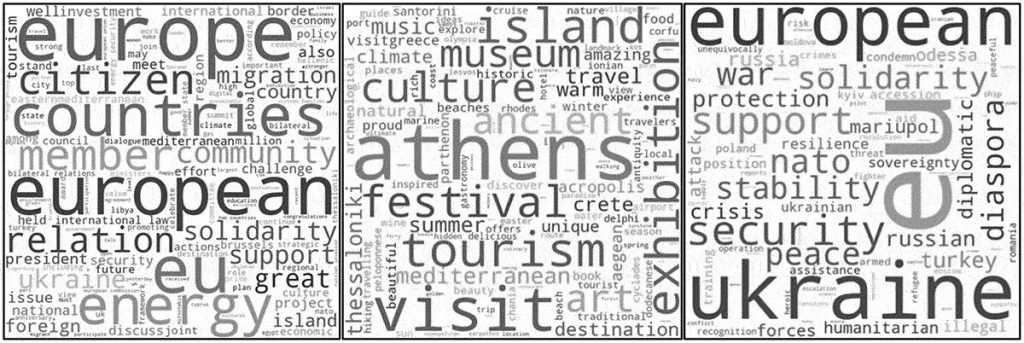
Assessing Greece’s transition to digital diplomacy: insights from Twitter/X (2021–2022)
Kacziba Péter (PTE) – Gibárti Sára (KRTK RKI) – Lechner Zoltán (PTE)

Why digital diplomacy?
Over the past decade, digital diplomacy has become a global phenomenon. Traditional intermediaries in public diplomacy have been supplemented – or even replaced – by digital platforms. Today, digital public diplomacy extends to local spaces and serves as a crucial tool in narrating and addressing major crises of recent years, such as the COVID-19 pandemic and the Russia-Ukraine war.
In the digital space, political activity is expanding, with a greater impact than traditional arenas, as it reaches media consumers instantly and in real time. Countries involved in conflicts or those with key roles in regional and global affairs must manage the growing scale of disinformation, which requires an immediate digital response and the ability to obtain an effective agenda-setting capacity. Failure to react promptly and decisively allows other international actors to shape public perception and dictate the narrative about important issues.
Methodology
The aim of the study was to explore how official digital diplomacy engagements and structures of Greece on the selected platform aligned with the country’s digital diplomacy reform objectives through data collection and content analysis methods. Given the prominent role of Twitter (now X) in Greek public diplomacy, the study examined the English-language posts of 40 Greek government officials over the sample period between 2021 and 2022. The study identified key digital diplomacy accounts on Twitter (X) including Ministry of Foreign Affairs, embassies, ministries, and government levels, while we ignored non-English tweets.
Findings
The results indicate that Greece has actively integrated digital diplomacy into its foreign policy, focusing on EU relations, the war in Ukraine, and regional affairs. In the digital diplomacy narrative, conflict-related issues such as tensions with Turkey have declined in favor of economic issues such as tourism and energy, suggesting a projection of a cooperative and investment-friendly image. Despite expanded efforts, challenges remain, including content inconsistencies, limited dialogues with the public, and a dominance of institutional over personal engagement. While progress is evident, Greece’s digital diplomacy still requires greater strategic coherence and engagement to align fully with modern public diplomacy trends.
Why is it important to look at Greece as a case study?
Examining digital diplomacy practices is especially relevant in a country like Greece, which faces numerous challenges on the EU’s southeastern flank. These include economic and financial crises, irregular migration, security risks, and proximity to both potential and ongoing conflicts – all while maintaining its status as a popular holiday destination. At the same time, Greece aspires to become a dominant regional power and a key player in the Balkans and the Eastern Mediterranean.
Kacziba, P., Gibárti, S., & Lechner, Z. (2025). Assessing Greece’s transition to digital diplomacy: insights from Twitter/X (2021–2022). Southeast European and Black Sea Studies, 1–32. https://doi.org/10.1080/14683857.2025.2457813


